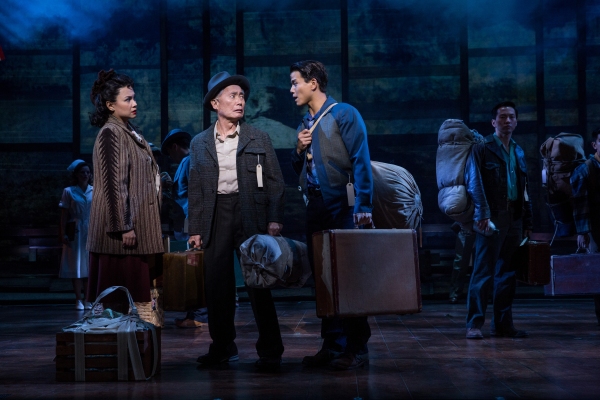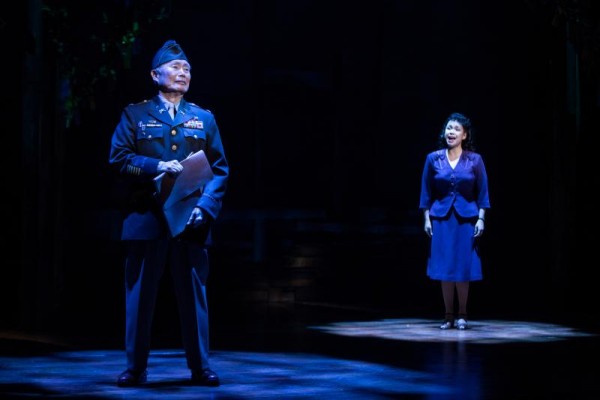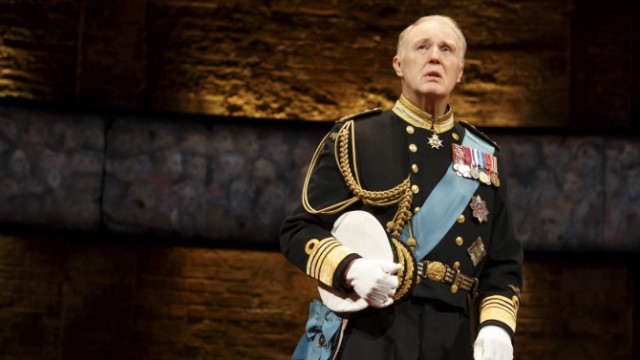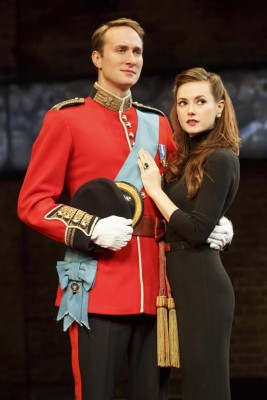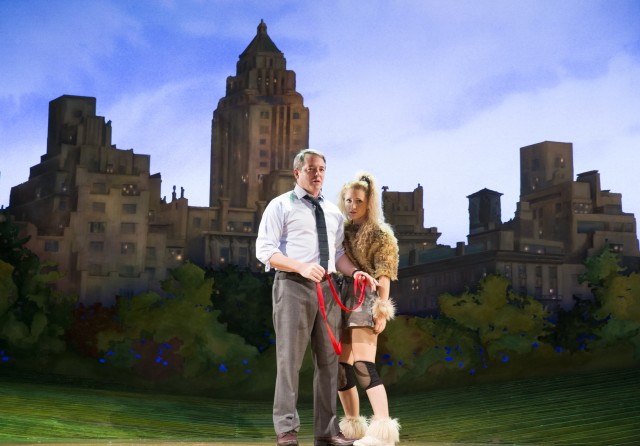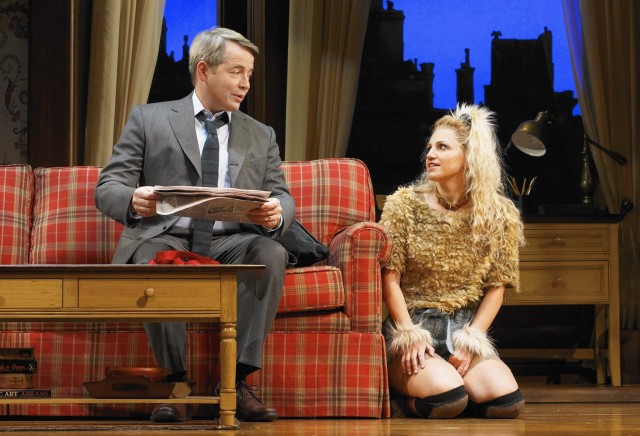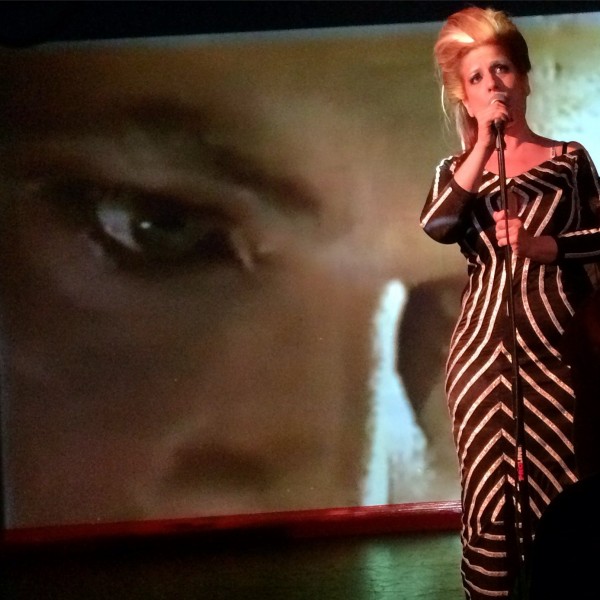
Raquel Cion goes glam in show exploring her lifetime obsession with David Bowie (photo by Crystal Durant)
ME & Mr. JONES: MY INTIMATE RELATIONSHIP WITH DAVID BOWIE
The Slipper Room
167 Orchard St. between Orchard & Allen Sts.
Monday, November 16, $15-$20, 8:00
www.slipperroom.com
It’s a particularly good time to be a David Bowie fan. After a long hiatus, the Thin White Duke has been busy of late, releasing new albums, composing music for Broadway and off-Broadway shows, and even writing a television series theme song. That especially makes Raquel Cion happy. The New York songstress, whose alter egos include cabaret performer Cou-Cou Bijoux and a city librarian, included Bowie tunes in her previous one-woman show, Gilding the Lonely, but her latest work is dedicated exclusively to music by the artist formerly known as David Jones. In Me & Mr. Jones: My Intimate Relationship with David Bowie, Cion explores deeply personal aspects of her life through the lens of Bowie and his long career, from his days as Ziggy Stardust to his acting in films and onstage and ultimate transformation into an international icon. Wearing a series of glittering glam gowns that would make Iman proud, Cion tells stories and sings hits and deep cuts with a crack live band, all while projections of both her life and Bowie’s pop up behind her. Cion is taking the ever-evolving show, previously performed at Judson Church and the PIT Loft, to the Slipper Room on November 16. As she prepared for this latest iteration of Me & Mr. Jones, twi-ny talk returnee Cion discussed the making of the show, sex, drugs, and rock and roll, and having her mother in the audience amid all the raunchy revelations.
twi-ny: You’ve performed Me & Mr. Jones at several venues in the past, including Judson Church and the PIT Loft. How has it evolved over time? For people who might have seen it before, how will it be adapted for the Slipper Room?
Raquel Cion: The response to the show has been amazing. The previous two shows were standing-room only and now at the Slipper Room, which is just such a beautiful venue, we have the room for our audience. Big, gorgeous high ceilings, it’s part club, part jewel-box proscenium with really good acoustics. The band is going to sound fantastic since there’s a great backline and sound system to support them. This band freakin’ rocks! We have Bill Gerstel on drums, Jeremy Bass on guitar, John Brodeur on bass, Chris DeAngelis on piano, and on vocals DM Salsberg and Matt Cleaver. They’re amazing. We can’t wait to fill that space. We’re gonna really be able to kick out the jams!
The projections by Dusty Childers and video edited by Jason Speenburgh will be much more visible since they’re above the band. Not to mention that my coat and gowns, designed by David Quinn, will look fab in the Slipper Room.
My wonderful director, Cynthia Cahill, and I have streamlined the script. I’ve added a bit of research I’ve been doing on the brain, how listening to music affects us and our limbic system, which is the neurological seat of love in the brain. I feel that Bowie has very distinct neurological pathways in me.
At the PIT Loft we did a live request where the audience called out a song and me and our former bassist, Keith Hartell, played it on acoustic guitar. Since this venue is bigger and we want things to be fair(ish), we’ll be giving out ballots with seven images of Bowie from different eras (my director reined me in and kept me to seven), so each audience member will choose their favorite era. The seven choices cover eras that we don’t cover in the show. We’ll be doing an encore from the time/album that has the most votes for an encore. Majority rules. Maybe we can do the second and third or more runners-up if they’ll let me. The first time I did the show at Judson Arts Wednesdays’ Open Swim we toyed with the idea of having the audience call out Bowie songs and having me sing a little bit of said songs acapella. We ended up not doing it because it felt a little like a parlor trick. But, hey, if anyone wants to spend some time with me, I’ll gladly turn that DB catalog trick for you.
twi-ny: The subtitle of your show is My Intimate Relationship with David Bowie, and you indeed share some very intimate details about your personal life. Is that difficult for you, or is it more of a liberating experience? You really get into the whole sex, drugs, and rock-and-roll thing; what was it like to perform it in front of your mother and other relatives at the PIT Loft?
RC: Is it difficult or is it a liberating experience? My answer is yes. Ask anyone who knows me and they’ll tell you I love Bowie. I wanted this show to be based in that “soul love” for Bowie, but I really wanted to dive in and look at why we love who we love, the lengths we go to connect with that entity, whether they are someone who we are sleeping with or someone who we have relied on as our emotional touchstone for decades. My last show, Gilding the Lonely at Joe’s Pub, was about loneliness, and I wanted to examine and embrace another emotion. Maybe a more silver-lined emotion, and I thought “love.” When I think of what or who I love, who has been my most devoted, chosen relationship, I think of David Bowie. As I say in the show, “His is the voice I have heard the most in my lifetime.” Of course, when I began working on creating the show, what showed up but loneliness. Damned if you do. . . .
I’m actually a pretty private person. So revealing things about myself that are maybe a bit messy is difficult. It’s a risk to own your stuff, your quirks, your heartache, because we’re all in that together, “not alone” and “wonderful.” Having the structure of the script, the incredible songs, the presence of the band, it all creates such a safe space. I love performing this show; it is an absolute joy. Really revealing the depth of my love for Bowie and how it reverberates throughout my life is indeed liberating and difficult.
In terms of having my family there, well, they’re somewhat used to the fact that I’ll say some things that will make them a bit uncomfortable, but they also know that seeing me perform is where they’ll most likely find out that information. My family can handle it. They’ve known me a long while. My mom, she takes pride in both my and my sister’s creative work. Hell, we grew up in West Hartford, Connecticut, and she has one daughter who sings Balkan music for a living and me. I think she enjoys her moment in the show where I talk about her dropping me off at gay bars as a teenager. Oh, she’ll be there, along with lots of the mishpucha next Monday. Hopefully she doesn’t show up during tech, though.
twi-ny: There’s been a flurry of Bowie activity recent, with the surprise release of The Next Day in 2013, the new song “Sue (or in a Season of Crime)” in 2014, Lazarus at New York Theatre Workshop opening later this month, and his new album, Blackstar, due in January. How has all of this impacted your intimate relationship with Mr. Jones, both personally and in your show?
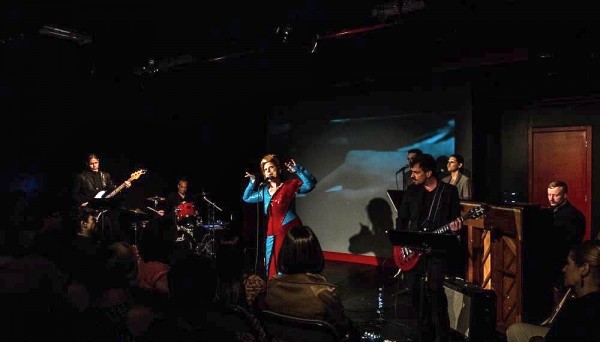
Raquel Cion is joined by an crack band for unique Bowie tribute show (photo by Jason Speenburgh)
RC: Isn’t it great to be amidst a flurry of Bowie activity? There’s a section in my show about when he released “Where Are We Now?” and The Next Day (though I don’t name the album) in 2013. There was something in the last incarnation of the show about “Sue (or in a Season of Crime)” and “’Tis a Pity She Was a Whore” but they didn’t make this draft’s cut. There is, of course, a bit about Lazarus and the new single and Blackstar. Oh, I have so much to say.
Let’s start with Lazarus. I have been losing my fucking mind over this since it was announced in April. New York Theatre Workshop is probably my favorite theater in New York. Ivo Van Hove is my favorite director. Enda Walsh is an incredible playwright, and, well, it’s Bowie. New music from him. Really, I haven’t stopped thinking about it since the announcement. They’re rehearsing now. He’s going to rehearsal. I’m beyond excited about it, and at the same time my heart is aching because, well, he’s right there. Right there. Doing the kind of work I love. I would give anything to be in that rehearsal room. Anything. Uh, so, yeah, that’s been my state of mind since April on that. I’m going to the show five times. And, uh, I don’t think five times is enough. I feel like I have to learn that show. Every piece of it.
I really could go on and on about the new music, which I really love. What I think is fascinating, though, about all of this is how brilliantly Bowie claimed his place in the psyches of his die-hard fans, new generations of fans and the media. He’s doing all of this on his own terms, creating because he is an artist and it’s ontologically necessary for him to create. I mean, there were whispers about new music coming over that near-decade of radio silence from him but two years of recording without it being leaked. It’s astounding in this age of constant “This is what I’m doing, eating, seeing . . . right now.” It’s a testament to the longevity of his brilliance and his relevance. He’s speaking only through his art. Not giving interviews. Not touring. We get the sound and vision through video, incredible short films he’s been making — hell, has always made — and the music. That’s it. He’s above the fray, and his work is unexpected. He’s working in different genres. Continually pushing boundaries. Please, put any of your readers in touch with me if they want to discuss any of the albums in detail. For real, I’d love to do that.
Obviously, I can’t wait for the new single. I’ve YouTubed the hell out of The Last Panthers opening credits to learn that song. Word on the street is the new album and single are gonna blow our minds. I’m all in.
Oh, you didn’t mention the song being written for the new SpongeBob SquarePants musical on Broadway. That’s happening too!
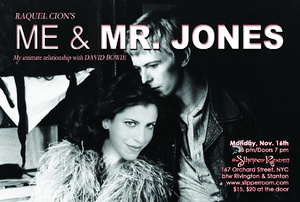
twi-ny: Yes, I did indeed skip that one. At the PIT Loft, you encouraged the audience to take photos and video. Will you be doing that again at the Slipper Room? Do you not find that distracting?
RC: I describe this show as a play disguised as a Bowie tribute show. Since it’s more toward cabaret or a tribute show, the phones come out anyway, so might as well embrace it. It’s kind of the way of the world right now and, well, it actually helps get the word out for the show. We do ask that the phone is silenced. Believe me, if I get distracted by someone’s phone, the whole audience will know about it.
twi-ny: Over the course of your love affair with Bowie, are there some songs you might have not liked at first but have since rediscovered, and are there others that you perhaps have grown tired of?
RC: Tired of, not really. Songs I’m not fond of, yes. This is another thing I’ve been investigating within this show. Why him? I get sick of pretty much everything but Bowie. I have an endless capacity for all things David. There are eras I don’t revisit much but I know all the music within those eras. I somehow always find a way in. It can be a certain melody, a quality of his voice within a song or even a note, a musical phrase or lyric. Once I’m in, I’m in. But I will say, as an example, “Never Let Me Down” let us all down. Hell, he’ll even say that.
twi-ny: When you’re not listening to Bowie, who are you listening to?
RC: I have very diverse taste in music. Lately I’m listening to a lot of Gladys Knight, Paul Weller, Dwight Yoakam, Lizz Wright, Prince — the list goes on and on. My musical choices are very driven by my mood and, well, I have Bowie for all of my moods, so he’s pervasive.
twi-ny: When you’re not onstage performing, you’re a librarian. Do you wear glitter at work?
RC: Ha! Once you’re glittered, it never ever fully goes away. Just ask any of my ex-boyfriends. I do love me some glitter, and there’s always a little residue.
